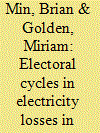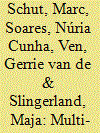| Srl | Item |
| 1 |
ID:
127291


|
|
|
|
|
| Publication |
2014.
|
| Summary/Abstract |
A third of electricity in India is lost each year, where losses refer to power that is supplied but not billed. Utilizing data from the power corporation of Uttar Pradesh, India's most populous state, we study the politics of electricity losses. Examining annual data over four decades, we document that UP's electricity losses tend to increase in periods immediately prior to state assembly elections. Drawing upon geographically disaggregated data for the period 2000-09, we observe higher line losses just prior to the 2002 and 2007 state elections. Our analysis shows that the incumbent party was more likely to retain the assembly seat as line losses in the locality increased. We interpret these results as corroboration that political parties deliberately redirect electricity to flat rate and unbilled users in a context of chronically inadequate supply. Political factors appear to affect line losses in ways that technical and economic factors alone cannot explain.
|
|
|
|
|
|
|
|
|
|
|
|
|
|
|
|
| 2 |
ID:
127293


|
|
|
|
|
| Publication |
2014.
|
| Summary/Abstract |
This paper describes and analyses the multi-actor governance process that made Mozambique the first African nation-state to develop a national policy framework for sustainable biofuels. The paper draws on findings from action research conducted in Mozambique between December 2008 and July 2012. We analyse interactions between the changing governance context, the course of the multi-actor governance process, and the choices in relation to governance framework characteristics and content for four successive stages of governance framework development. This provides the basis for reflection on the competences required for effective multi-actor sustainability governance, and a discussion about the role of the nation-state in sustainability governance of global economies such as biofuels.
The governance framework for sustainable biofuels has contributed to a more transparent and secure investment climate for biofuels in Mozambique. Key factors for success were (1) the presence of different types of competences during the various stages of the governance framework development, (2) closing the gap between 'licences to sell' and 'licences to produce' across different governance levels, and (3) balancing between the short- and long-term objectives for biofuel production in Mozambique and requirements of global biofuel markets. Developing-country nation-states can provide an essential contribution to these success-factors for global governance of sustainable biofuels.
|
|
|
|
|
|
|
|
|
|
|
|
|
|
|
|
| 3 |
ID:
127292


|
|
|
|
|
| Publication |
2014.
|
| Summary/Abstract |
Energy efficiency levels for the Standards and Labeling (S&L) program in India for frost free (FF) refrigerators are compared with similar programs in China, United States of America (USA), and European Union (EU). A normalization method developed by International Energy Agency (IEA) is adopted with India as a benchmark for comparison. It is observed that the energy consumption level corresponding to minimum energy performance standard (MEPS) is very high in India. India also lags behind other countries on the consumption level corresponding to highest efficiency rating. Also, the range of consumption levels corresponding to a label is wide which dilutes the efficacy of label. India has aggressively proposed to tighten the ratings for FF refrigerators in 2014 by 36% across all the bands. This measure will make its highest efficiency rating comparable to other countries. However, due to the wide gap in the consumption levels across the ratings, the revised MEPS will still lag behind other countries. One possible outcome of high MEPS is that as the ratings are tightened, the market may move to lower star rated models significantly undermining the tightening effect.
|
|
|
|
|
|
|
|
|
|
|
|
|
|
|
|